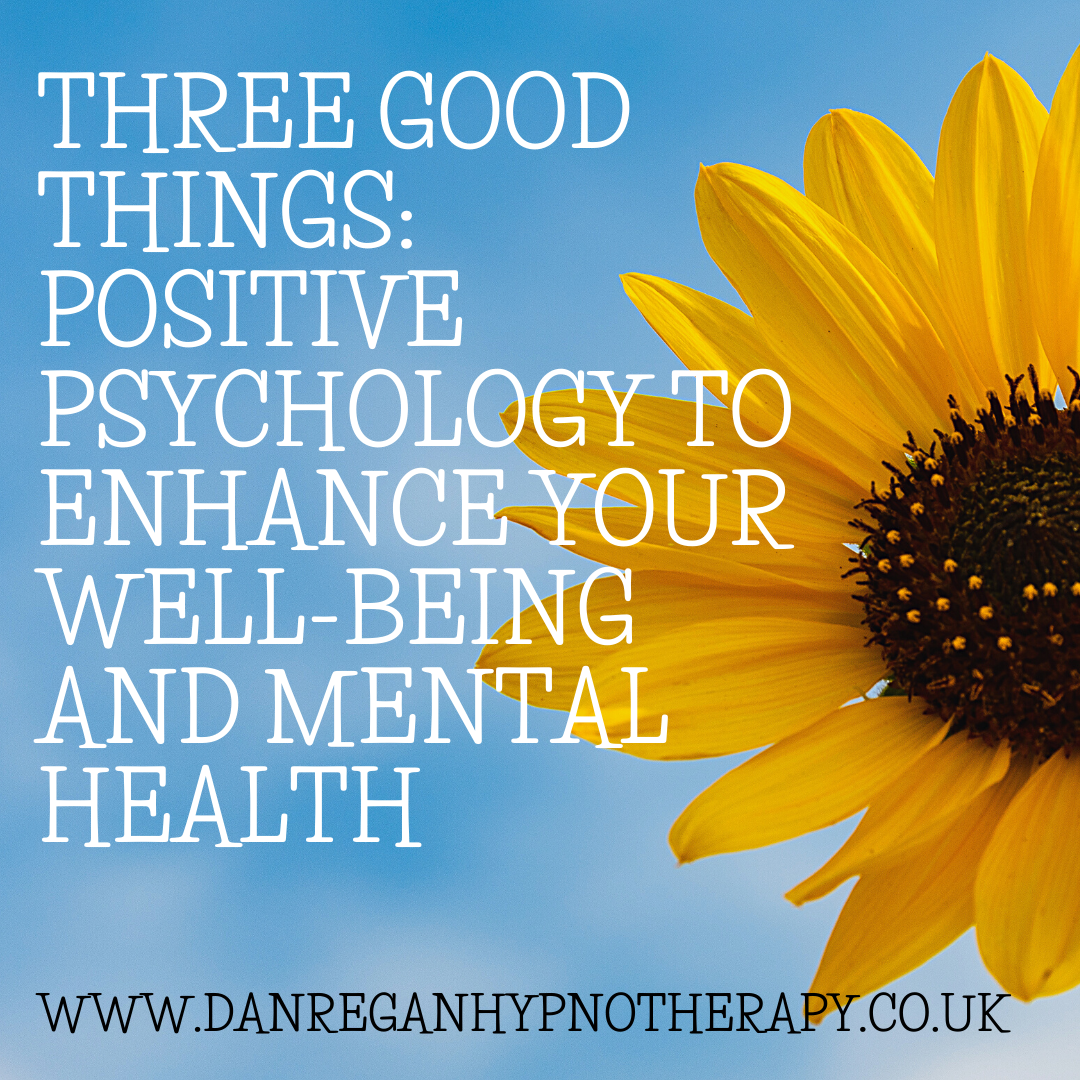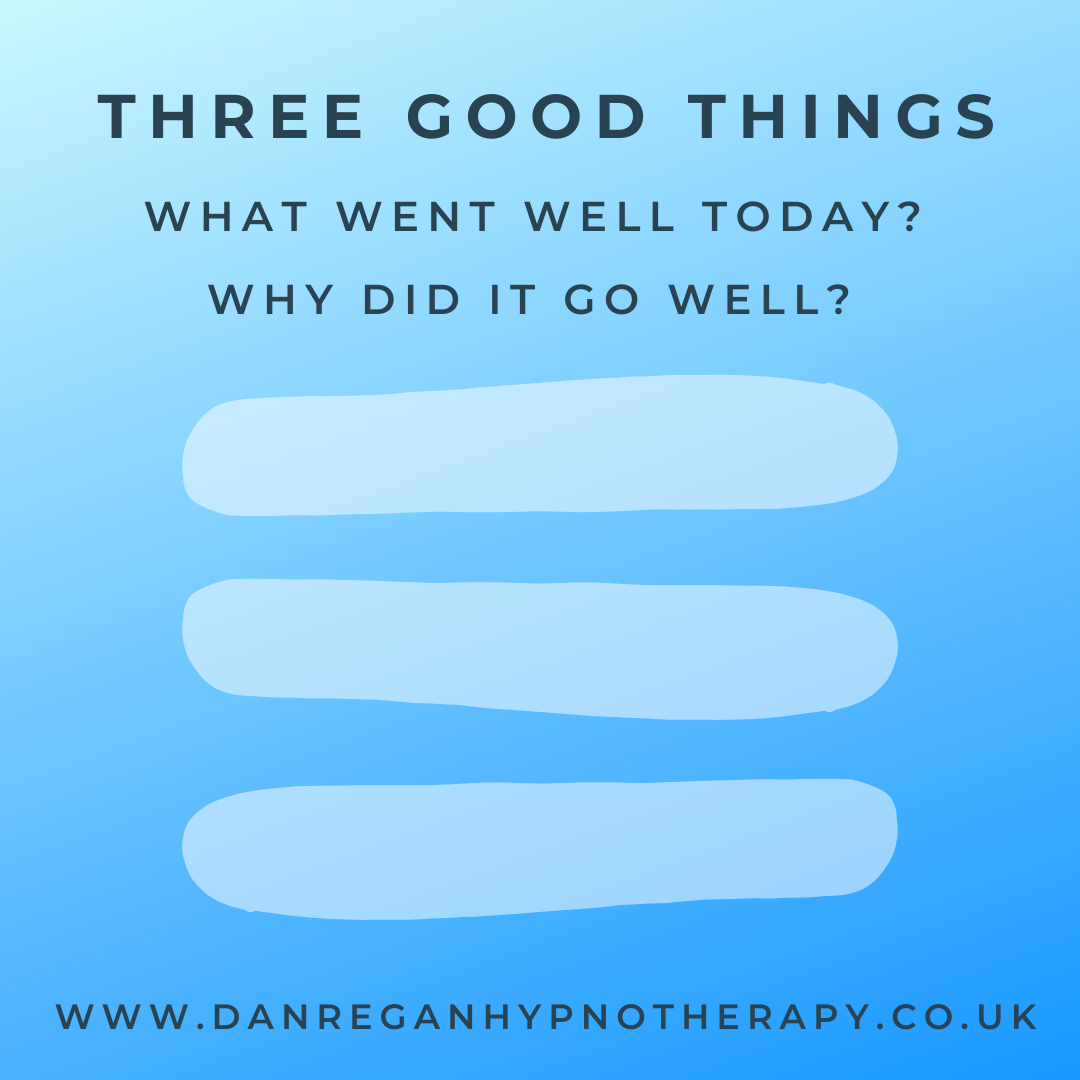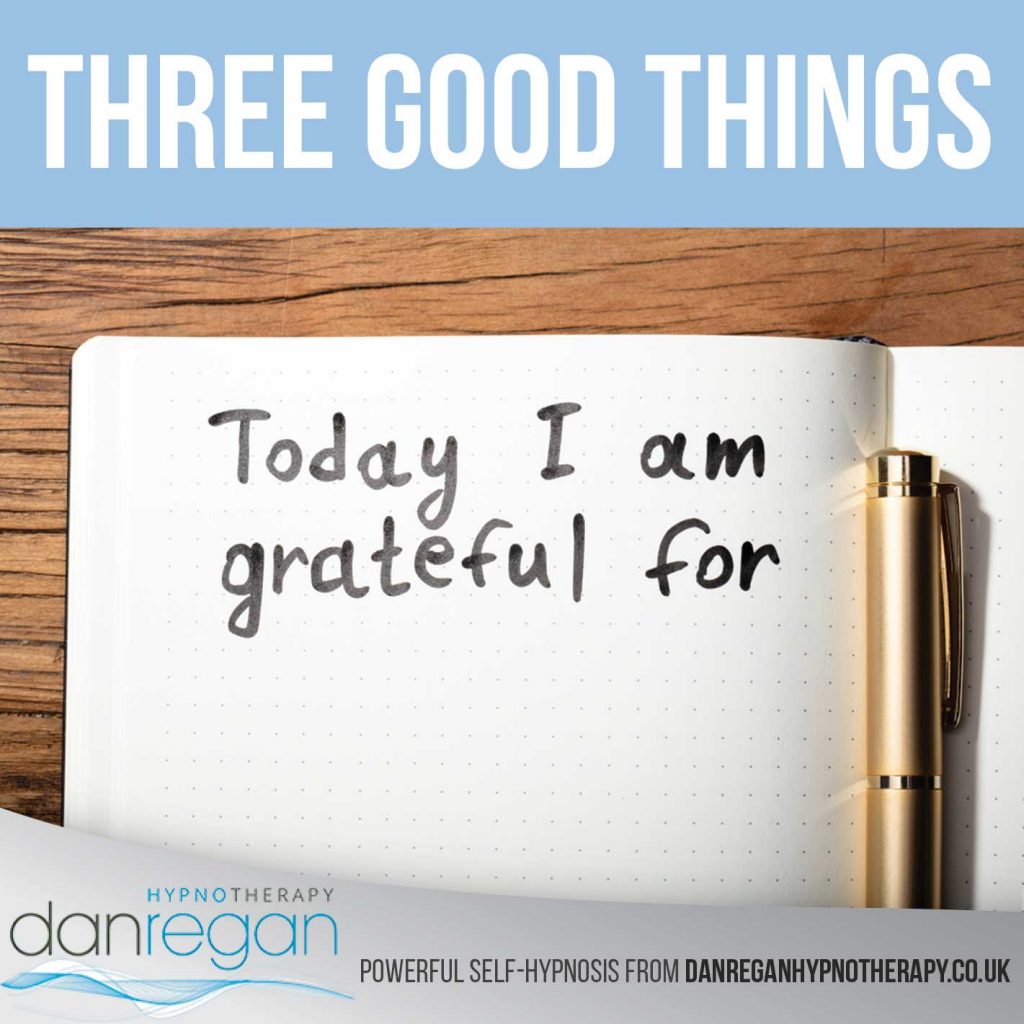Required
Three Good Things: Positive Psychology To Enhance Your Well-Being And Mental Health
Three Good Things: Positive Psychology To Enhance Your Well-Being And Mental Health
As I write this, we are still in the middle of the third Covid-19 pandemic lockdown. In my last article, I wrote about a couple of research-supported positive psychological interventions that can help promote your well-being and support your resilience to things.
Today, I’m going into more depth about one of these techniques, the three good things, and the benefits of carrying our this straight forward exercise each day.
Despite its many challenges and its adverse impact on mental health, perhaps one positive of the pandemic has been a sense of appreciation about, and gratitude for, things that we may have taken for granted before. We can all feel grateful for our health, our loved ones, the roof over our heads, the ability to get out and move, the kindness of others, the awesome dedication and effort of NHS staff and other key workers, and a whole host of other things.
Having the ability to get out and exercise is something I’m certainly appreciating, both because of the possibility it could be taken away, and because of the benefits to my mental health, especially if I incorporate some time in nature too. I value conversations and time with family in an enhanced way, and one of the pluses of working from home is having more interactions with the kids throughout the day, and spending more time in the evening doing things with them (at the moment playing ‘keepie uppie’ with balloons is a favourite bit of fun!).
One of the tasks I often set my clients is to spend a few minutes at the end of each day thinking back on three good things, or positive things, from that day. With anxiety, depression, stress, worry or overthinking the tendency is to spend more and more time thinking about negative or bad things or the kind of things that made you feel anxious, low or down in some way. Thinking about three positive things starts to counter that by deliberate and conscious focus on things that are going right. In conjunction with our hypnotherapy sessions, it starts to shift thoughts and feelings more towards how someone wants them to be.
And it turns out that there is a lot of evidence supporting this psychological technique. Consistently adopting the three good things practice can promote your well-being, increase positive emotions and happiness, lessen negative emotions and support your resilience. As I’ll cover here, this gratitude activity really does have positive psychological benefits for you.
Gratitude, Well-Being & Mental Health
There’s a wealth of scientific research that supports the benefits of practising gratitude for promoting your well-being and mental health. Gratitude has been positively correlated with several aspects of well-being and mental health including life satisfaction, happiness, optimism and positivity. Gratitude also significantly predicts less depression and anxiety symptoms.
By gratitude, we are talking about noticing and appreciating the benefits you receive. and the positive experiences and outcomes you obtain.
As self-criticism can be a component of anxiety and depression, practicing gratitude can help support your mental health and well-being and may even offer some protection from common mental health problems.
Consistently applying gratitude practices can help you feel more satisfied in life, experience more well-being, feel more positive and strengthen your mental health. As if that wasn’t enough, it can help boost your self-esteem, improve how you feel in yourself, and reduce the likelihood of depression and anxiety.
Typical gratitude practices include gratitude lists, where you write a list of things you are grateful for on a regular basis. Another technique to foster gratitude involves behavioural expression of gratitude, for example, you might write and deliver a letter to a person (a ‘gratitude letter’) whom you have not yet thanked properly.
And there is also grateful contemplation, where you think or write about things you are grateful for in a more global fashion. Rash, Matsuba & Prkachin (Gratitude and well‐being: Who benefits the most from a gratitude intervention? 2011), found that this sort of grateful contemplation led to increased self-esteem, life satisfaction and well-being.
There’s more on the science and the benefits of gratitude in these related articles:
The Impact of Gratitude on Anxiety, Depression, Self-Esteem and Well-being
Gratitude and Well-Being: How To Improve Your Well-Being and Self-Esteem
Three Good Things: Boost Your Well-Being
One of the positive psychology techniques for increasing well-being is the ‘Three Good Things’ intervention. This involves listing three good things that went well each day, and the reasons why they went well.
I’ve covered in another article how this technique (along with another I’ll be writing more in depth about soon), has been shown to contribute to promoting your well-being during the Covid-19 lockdown.
Dennis, Ogden and Hepper (Evaluating the impact of a time orientation intervention on well-being during the COVID-19 lockdown: past, present or future? 2020) looked at three interventions from positive psychology, including this gratitude-based intervention (listing the three good things). The results showed that focusing on the present, through gratitude (as well as focusing on the future) were effective at promoting well-being during the Covid-19 pandemic lockdown.
There is a growing wealth of research and evidence supporting the effectiveness of the three good things intervention.
Seligman et al (Positive psychology progress: empirical validation of interventions. 2005), asked study participants to write down three things that went well each day and why they went well. Those who carried out this exercise were happier and less depressed at one month and six month follow ups. And Bolier et al (Positive psychology interventions: a meta-analysis of randomized controlled studies. 2013), in a meta-analysis of positive psychology interventions, including this technique, found that they can be effective in the enhancement of subjective well-being and psychological well-being, as well as in helping to reduce depressive symptoms.
Given that positive emotions contribute to psychological well-being and resilience, and the ability to cope with life’s challenges, any interventions that are evidenced to help you improve happiness and well-being can help support you to experience more positive emotions and to deal with any negative emotions.
These positive results have also been found in the field of healthcare workers, who often work in highly stressful and emotional situations that can lead to burn-out and stress related trauma. Rippstein-Leuenberger et al (A qualitative analysis of the Three Good Things intervention in healthcare workers. 2017), had participants complete the three good things exercise for fourteen days and found that it helped promote the well-being of the healthcare workers, which could contribute to strengthened resilience.
The responses suggest that achieving work satisfaction, relationship satisfaction and a sense of autonomy were prevalent components of self-reported positive emotions. “In essence, this is what we feel the Three Good Things exercise does: it creates a structure that allows participants to reflect on frequent but relatively simple and small doses of positive emotion” (Rippstein-Leuenberger et al, 2017).
We also have the research from Lai and O’Carroll (The Three Good Things – the effects of gratitude practice on well-being: a randomised controlled trial, 2017) who had participants to write down each day for twenty-one days, three things in their life that they were grateful for. Their study showed that this simple exercise can help improve your psychological well-being.
More recently, research by Adair, Kennedy and Sexton (Three Good Tools: Positively reflecting backwards and forwards is associated with robust improvements in well-being across three distinct interventions, 2020), has also demonstrated that carrying out the three good things intervention can help improve well-being.
And so, it seems pretty clear from the evidence here, that the three things intervention can help you to boost your well-being, add to feeling more positive, experience lessened negative emotions and develop resilience to handle and cope with challenges.
Boost Your Psychological Well-Being
As a simple daily exercise you could repeat this psychological intervention and write down each day three things that went well that day and why they went well (what was your role in making it happen?). Repeating this daily will help promote your well-being, add to your positivity and likely reduce negative emotions and symptoms.
And here’s an expanded version that builds upon the research I’ve described here and that is designed to boost your well-being, enhance your positivity and add to your sense of ability to handle and cope with challenges that come your way.
1. Sit somewhere quiet, take a deep breath and close your eyes. If you know self-hypnosis or meditation techniques you could incorporate these here. Start to extend your out breath and say the word ‘relax’ to yourself on every breath out. You could tense and relax each part of your body or tell yourself that each part of your body is relaxing. You could imagine a calm colour or sensation spreading through you or fill your mind with a relaxing sound. You could engage your imagination and imagine being in a remembered or created place of calmness, seeing the sights and hearing the sounds. Or you can draw upon and utilise any other ways that allow you to feel comfortable, calm and relaxed. Your aim here is just to feel as safe, calm and comfortable as you can right now.
2. Begin to think back through your day, the kind of situations, people and places you’ve encountered. Recall how you’ve been spending your time, mindset and where your attention, focus and thinking has been. As you do so, think of something good that has happened in your day. This could be something that went well, something you were pleased or proud about, something you appreciate or are grateful for, good progress you’ve made, moments when you felt happy or positive for some reason, or any other thing that you consider to be have been a good thing (regardless of whether someone else would have considered it to be a good thing).
3. Start to recall it in detail, like you’re back there in that moment, seeing what you saw, hearing what you heard and feeling that good feeling. Run through in your mind as vividly asa you can now. Notice the colours, details and shades of light. Hear the sounds, those close by and those further away. And recall that good feeling that goes with this good thing from your day. Let the kind of sights, sounds, feelings and thoughts that you have in this time come to the front of your awareness.
You can notice what makes this a good thing for you. What is it about this thing that made it good? Why was this a good thing? You can notice what you saw, heard, felt. You can notice your thoughts, feelings, actions and reactions and whatever you did that contributed to making this a good thing for you today.
4. Having done that with the first good thing from your day, repeat the previous two steps with the next two good things form your day, taking each one at a time.
5. Now, having thought of your three good things from your day, really know and tell yourself how you intend to have more of these good moments in your life. You can be realistic and know that every day has its ups and downs, yet set the intention to notice more and more of the good stuff, to experience more gratitude, more positivity and increased well-being. Commit to yourself that you will do this ‘three good things’ exercise each day, recalling three good things, why they were good and what you did in making them happen.
6. Take a deep breath and open your eyes. Know that you have promoted your psychological well-being here today and that this will help you to deal with life’s challenges, to experience more positive emotions and happiness, and to lessen negative emotions. You may want to already start looking forward to, and thinking about, the good things you are looking forward to tomorrow.
Have fun with this exercise and thinking about your three good things. Adopting this positive psychology intervention really will increase your sense of well-being and happiness, and the more you do it, the more things you will notice and the more positivity you can and will derive from them.
And if you’d like to make the most of this research supported way to boost your we-being and mental health, please do take a look at this Three Good Things hypnosis download where I fully guide you through it:
To your health and happiness,
Dan Regan
Online Skype and Zoom Hypnotherapy
Face-to-face hypnotherapy in Ely & Newmarket
Struggling with anxiety, stress, worry and fear and need some help? Find out how I can help with a Complimentary Hypnotherapy Strategy Session. Learn more here: Appointments
Find out what dozens of other people have said after their hypnotherapy sessions with Dan: Hypnotherapy Testimonials
And check out these powerful hypnosis downloads that can start helping you right away with anxiety, confidence and more: Hypnosis Downloads
References:
Adair, K.C., Kennedy, L.A. and Sexton, J.B., 2020. Three Good Tools: Positively reflecting backwards and forwards is associated with robust improvements in well-being across three distinct interventions. The Journal of Positive Psychology, 15(5), pp.613-622.
Bolier, L., Haverman, M., Westerhof, G.J., Riper, H., Smit, F. and Bohlmeijer, E., 2013. Positive psychology interventions: a meta-analysis of randomized controlled studies. BMC public health, 13(1), pp.1-20.
Dennis, A., Ogden, J. and Hepper, E.G., 2020. Evaluating the impact of a time orientation intervention on well-being during the COVID-19 lockdown: past, present or future?. The Journal of Positive Psychology, pp.1-11.
Lai, S.T. and O’Carroll, R.E., 2017. ‘The Three Good Things’-the effects of gratitude practice on wellbeing: a randomised controlled trial. Health Psychology Update, 26(1), p.11.
Petrocchi, Nicola, and Alessandro Couyoumdjian. “The impact of gratitude on depression and anxiety: the mediating role of criticizing, attacking, and reassuring the self.” Self and Identity15, no. 2 (2016): 191-205.
Rash, Joshua A., M. Kyle Matsuba, and Kenneth M. Prkachin. “Gratitude and well‐being: Who benefits the most from a gratitude intervention?.” Applied Psychology: Health and Well‐Being 3, no. 3 (2011): 350-369.
Rippstein-Leuenberger, K., Mauthner, O., Sexton, J.B. and Schwendimann, R., 2017. A qualitative analysis of the Three Good Things intervention in healthcare workers. BMJ open, 7(5).
Seligman, M.E., Steen, T.A., Park, N. and Peterson, C., 2005. Positive psychology progress: empirical validation of interventions. American psychologist, 60(5), p.410.
Wood, Alex M., Jeffrey J. Froh, and Adam WA Geraghty. “Gratitude and well-being: A review and theoretical integration.” Clinical psychology review 30, no. 7 (2010): 890-905.
Get Your Copy Right Now…
Subscribe to Dan’s Digest filled with tips, strategies and techniques and get instant access to your free rapid relaxation hypnosis audio track.
Enjoy feeling and being more mentally calm and physically relaxed right now:







0 Comments